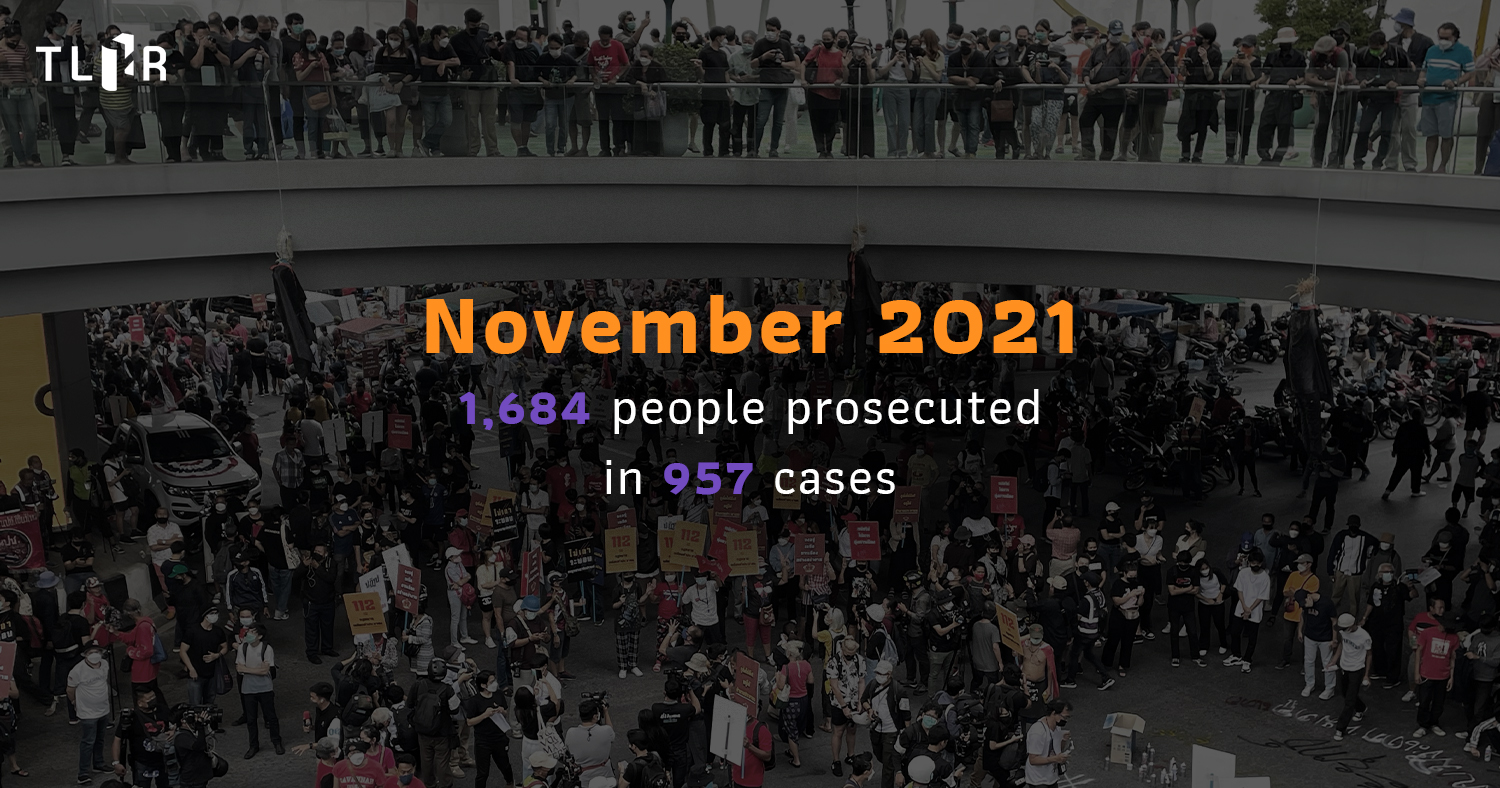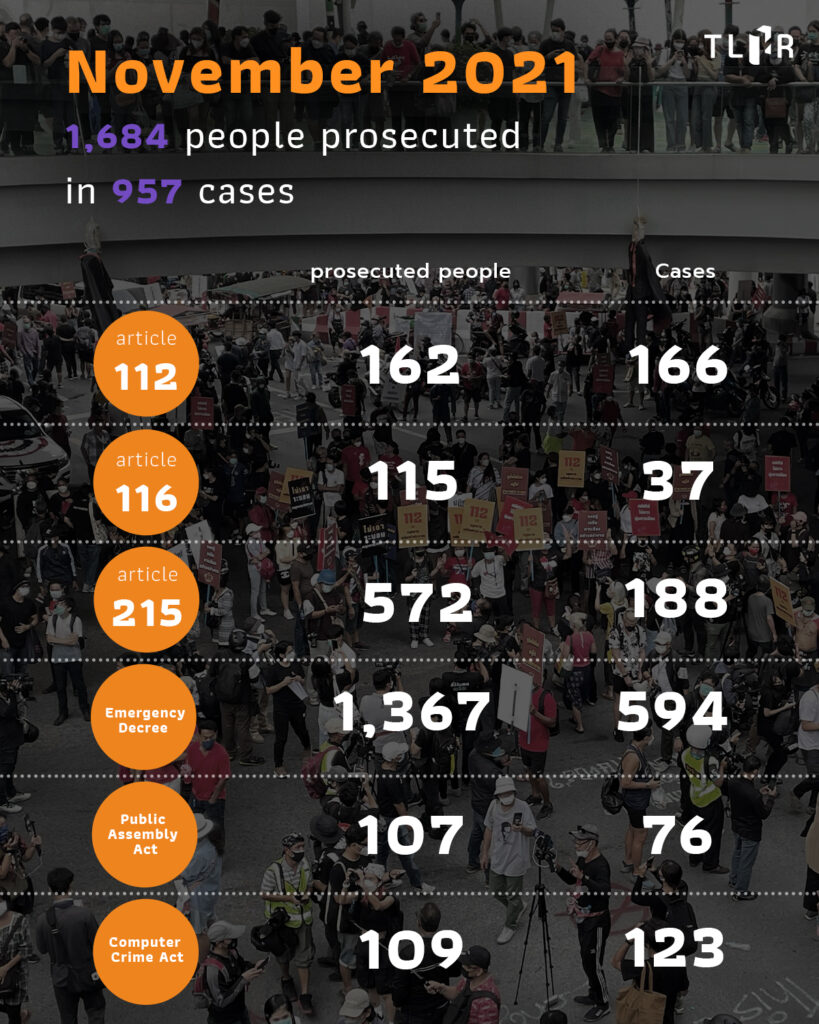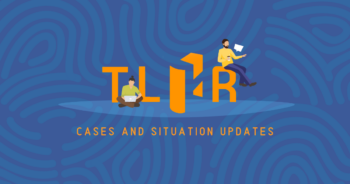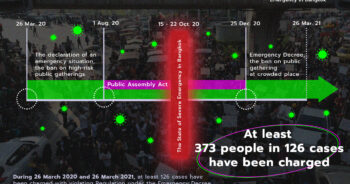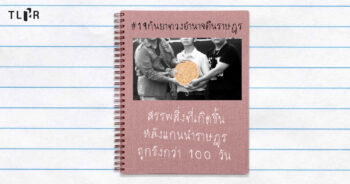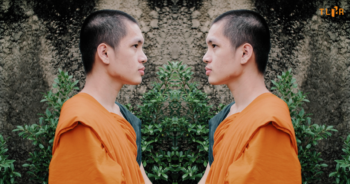According to the TLHR statistics, at least 1,684 people in 957 cases have faced lawsuits for their political participation and expression since the “Free Youth” rally on 18 July 2020 until the end of November 2021. 143 of them have been concluded, most of which concerned the accused agreeing to pay fine during the police or court stage.
Compared to the figures as of the end of October 2021, this month saw an increase of 48 individuals and 61 cases (only counting those who had not been charged before), including 9 youths. The trend of lawsuits has slowed down compared to August-October, as the Din Daeng protests and the car mob activities did not take place as frequently as before. However, the police still continued to issue summon warrants for people joining protests retroactively.
- “Lèse-majesté” or the Section 112 of the Penal Code: at least 162 people in 166 cases
- “Sedition” in the Section 116 of the Penal Code: at least 115 people in 37 cases
- “Being assembled together do an act of violence to cause a breach of the peace” in the Section 215 of the Penal Code: at least 572 people in 188 cases
- Violation of the Emergency Decree: at least 1,367 people in 594 cases, which are divided into 24 cases during the declaration of a serious emergency situation in Bangkok and 529 cases involving the breaching of the Covid-19-related provisions.
- Public Assembly Act of 2015: at least 107 people in 76 cases
- Computer Crime Act: at least 109 people in 123 cases.
*Statistical numbers are all of the freedom of expression and assembly cases.
During November 2021, TLHR saw significant trend as follows;
Public prosecutor speedily indicted 40% of all Section 112 cases, whereas more activists were pressed charge.
In November, at least 8 people in 7 cases have faced the so-called “royal defamation” charge under Section 112 of the Penal Code. As a result, a total of 162 people in 166 cases have been accused, including 13 youths and 5 people who were detained during trial without the right to bail include Arnon Nampa, Parit Chiwarak, Jatupat Boonpattararaksa, Panupong Jadnok, and Benja Apan.
An important case is that of Thanawat ‘Poon’, who was accused of Section 112 by the Su-ngai Kolok Police Station for posting 8 texts in the Royalist Marketplace Facebook group. Being under 18 years old at the time, Thanapat’s case became another Section 112 case involving a juvenile.
Some prominent political activists have faced additional accusation in new cases. Parit ‘Penguin’ Chiwarak was accused of Section 112 by Bang Pho Police Station retroactively for the speech made at the 17 November 2020 protest in front of the parliament. Hence, Penguin now has 22 Section 112 cases on him. Chonthicha ‘Lookkate’ Jaengraew also received her second case from the Thanyaburi Police Station due to her speech at the protest in front of the Thanyaburi Provincial Court on 11 September 2021 while waiting for the bail revocation result for activists.
Outside of Bangkok, Mueang Phatthalung Police Station obtained arrest warrants from the court, with no summon warrants being issued first, to arrest three students and Southern Ratsadon activists for taking pictures of various sites in the province and shared them with political captions in the “Free Phatthalung” and “Democracy in Southern Thailand” Facebook page in 2020.
Regarding the Section 112 cases, it was found that public prosecutors have sped up the indictment process. Out of 166 cases, 68 have already been forwarded to the court, accounting for 40% of the known cases. Intira “Sai” Jaroenpura was the only (Section 112) case from the protest in front of the 11th Infantry Division on 29 November 2020 that was not indicted, though she was indicted in another Section 116 case along with other activists. Apart from that exception, we have found no section 112 case that has not been indicted, which summarizes the overall tendency of the section 112 lawsuits.
The Constitutional Court ruled that the 3 Ratsadon leaders intended to overthrow the constitutional monarchy
On 10 November 2021, the Constitutional Court passed a decision for the petition filed by Mr. Nataporn Toprayoon seeking the court’s judgment whether the political participation and the speeches of Arnon Nampa, Panupong Jadnok, and Panusaya Sithijirawattanakul at the assembly at Thammasat University, Rangsit Campus, on 10 August 2020 were an exercise of rights and freedoms to overthrow the constitutional monarchy regime according to Section 49 of the 2017 Constitution, as well as the court’s order to make the concerned parties discontinue the said actions.
The Constitutional Court passed a resolution by majority vote of 8 to 1 that the repeated actions and behavior of the three activists showed a covert intention to erode and undermine, and are regarded as an exercise of rights and freedoms to overthrow the constitutional monarchy regime. The Court saw that the proposal to repeal Section 6 of the Constitution, for instance, which concerned the unaccusable and inviolable nature of the King, suggested an obvious intention to overthrow the monarchy, or that the actions of the three concerned parties were considered an organized effort to incite the public, spread false information, use vulgar words, and cause disorder and violence in the society. The Constitutional Court has thus issued an order requiring the three concerned parties and their networks to refrain from the said actions in the future.
The Court’s opinion sparked broad criticisms, both in terms of the process as well as the content. The court’s process did not allow the concerned parties to defend or explain themselves and thus infringed their right to due process. The content of the decision exceeded the scope of the request and did not adequately present facts related to the actions of the concerned parties. The reasoning also lacked clarity and foundation. The part ‘covert agenda’ solely belongs to the judges’ opinion with no supporting facts or evidences. Furthermore, the decision is not consistent with the principles stated in the Constitution or of the constitutional monarchy itself. As such, the opinion may further widen and exacerbate the conflicts in Thai society.
In response to the Court’s decision, a protest march was organized by a group called “No Absolute Monarchy” on 14 November 2021 from Ratchaprasong Intersection to the German Embassy. The Court’s website was also hacked and renamed to “Kangaroo Court”.
On 15 November 2021, the day after the said activity, the Bangkok South Criminal Court did not grant bail to Panusya “Rung” Sithijirawattanakul in the Section 112 case for wearing a crop top at Siam Paragon on 20 December 2020. The Court reasoned that it feared the defendant would commit an act resembling the offence in this case again. The Criminal Court also revoked Rung’s bail in the case of 19-20 September 2020 protest, establishing that Rung had violated the bail conditions. Later at the end of November, both courts granted bail to Rung until 12 January 2022, during which she was allowed to attend exams. Conditions were set requiring Rung, among others, to stay in her house at all times, except for exams or court appointments.
Police Officers pressed the Emergency Decree charge against people seen at Din Daeng Protest site
Despite more open policies and relaxed Covid-19 measures, Gen Prayuth Chan-ocha has announced the nationwide extension of the emergency situation by the end of November for two more months until the end of January 2022. As a result, the provisions under the Emergency Decree will have been enforced for almost two years consecutively.
While the so-called “Talu-gas” protests did not take place as they previously had, police from the Din Daeng Police Station still continuously issued warrants summoning people found to be on the protest site during August – October 2021 to hear the charges, which were pressed separately each day.
Such approach has affected many people who passed by, observed, or live-broadcasted the protests in Din Daeng, and not directly involved in the confrontations or the protests themselves. Some individuals faced multiple charges according to the days on which they were allegedly seen on the site. For example, Charnchai Pudrangsri, a former red-shirt guard who received 26 charges alone, Teeramet (last name undisclosed), a homeless man who received 6 charges and was not granted bail in one of them, or Katanyu Muenkamrueang, a Talu-fah member who was accused in 6 cases from Din Daeng.
Meanwhile, the police issued summon warrants containing charges under the Emergency Decree for activists who participated in and held speeches at public discussions or political assemblies. This includes 17 people from the anti-Prayuth activity at the 14 October 1973 Memorial on 3 October 2021, 13 people from the (naked) car mob activity by the Free Feminists group on 9 October 2021 at the Democracy Monument, and 13 people from the big rally calling for the abolition of Section 112 at the Ratchaprasong Intersection on 31 October 2021.
The Court convicted all activists in three contempt cases.
In November, the Court passed a judgment on three contempt of court cases, including the case of Banja Apan and Natchanon Pairote, two student members of the United Front of Thammasat and Demonstration, from the activity in front of the Criminal Court to demand the right to bail for political prisoners on 29 April 2021. The Court inflicted Benja a full penalty of 6-month imprisonment without suspension and Natchanon a 4-month imprisonment without suspension as well.
In Benja’s case, the Court explained the decision to give full sentence without commutation that the accused insisted that she was not guilty, which meant that she did not feel repentant. However, to defend oneself in a trial is the defendant’s right and should not have been used as an excuse to give a heavy penalty.
In addition, nine activists were accused of contempt for a political expression in the court’s detention room at the Thanyaburi Provincial Court, after learning that they were not granted bail in the case of protest in front of the Border Patrol Police Region 1. The Court gave a sentence of imprisonment for 20 days each, which were commuted by half to 10 days due to confession. However, seeing that many of the accused were students and had already been imprisoned, the Court changed the imprisonment sentence to 10-day confinement instead.
In a contempt case, the court may proceed to examine evidences and punish the offenders by itself without an investigation or accusation process. Nevertheless, since the offence is directly related to the court, it jeopardizes the principle of due process. At the same time, as the political situation intensifies and the court’s role in political cases increases, the use and implication of contempt charge deserve to be closely watched.
